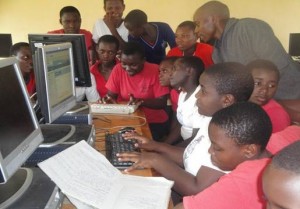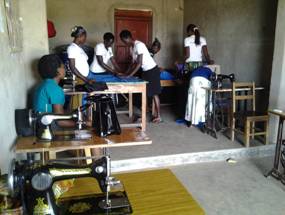Projects
RIC-NET projects are hinged on rights based approach with emphasis ICT and social inclusion in EHAGE -Education, Health (preventive), Agriculture(plant health & agro-business), Governance(civic engagement and Human Rights Defenders) and Environment (adaptation[1]) . The current six projects are:
Project 1: ICT in teaching and Learning of English language
This project is on improving effective teaching-learning processes through ICT enabled innovative methods in Primary Teachers Colleges and Secondary schools in Kasese and Kabarole Districts. It aims to contribute to the attainment of national education objectives and the MDGs (2) and Uganda’s National Development Plan. The project targets 2 PTCs and 6 Secondary schools in two districts in the Rwenzori region which is about 400 km from the capital Kampala where the digital gap gets wider as you move from the capital. The government programme of training teachers in ICT integration is skewed to only science teachers and thus creating another digital gap amongst the teachers.
A remarkable Improvement in online research for learning aids teachers’ ability to work with the computer, the quality of lesson preparation and presentation, motivation of teachers and willingness to accept the dynamic teaching environment.
Project 2: Young Global citizens through shared STEM
This is an ICT based educational services that is creating a community of young global citizens through shared STEM, (Science, Technology, Engineering and Mathematics), based classes in the after-school programs. Level up Village (USA based company) a partner with Ric-NET in this pro
ject, provides an innovative after school classes to children in a way that inspires global citizenship and a love of learning.
Project 3: Advancing the Dignity of Children and Youth
The project focuses on offering a range of capacity development services or tailor-made training especially for young women in and out of school who were severely affected by conflicts. The program uses social media and Community Theatre to break or remove some of the barriers such as stigmatization that prevent young girls from going to school or that make de them drop out of school. Teachers are trained to help address some of the challenges abused and traumatized girls face in school.
The project focuses on supporting young people to acquire employable and entrepreneurial skills, customized reproductive health and at least weekly psycho- social support. It also focuses on enabling and facilitating girls’ access school, and ensures they complete school, making these girls productive members of society and support young women’s babies by enrolling their children in a nursery program, while helping the mothers to either go back to school or attain a skill to reduce on poverty. The information on the plight of these girls at individual and community levels is amplified through social media and media in order the community and local leadership to take on their roles in supporting these girls.
Project 4: Strengthening Political Competition and Consensus Building (PCCB) in Kabarole and Kamwenge Districts.
The project focuses on supporting community civic activists to enhance citizens’ civic competences in order to build consensus among citizens on key critical issues and demand for political and social accountability from their leaders. Hence, the project consequently entails building grassroots civic activist (60) that systematically builds a mass movement that influences citizens to take action on political, governance, human rights and social accountability issues in their communities; and build consensus towards a new political paradigm in Uganda.
Project 5: Community-led mechanisms to prevent violence against children and adolescents in Kasese District, Rwenzori Region.
The project is built on the notion that violence against children is manifested by among others lack of economic empowerment of women who are at the center stage, information gap, domestic violence, drug abuse, transition of childhood and adulthood and also peer pressure. The project Sensitize stakeholders on dangers of violence against children and adolescents; contributes towards mitigation the violence against children by addressing the causes and effects of violence on children by working with the children, local communities and the leaders in the Rwenzori region. The project builds capacity of 160 teachers in prevention of violence against children skills, Supports the child-to-child initiatives, strengthens links with other sister organization to advocate for children’s rights at regional and national level.
Project 6: Community action to prevent and manage conflicts and human rights violations in Ruwenzori Region of Uganda.
The project recognizes and uses the power and mechanisms that exists in community to improve the state- citizen relations at the local government level and to demand government responsiveness in conflicts, governance and human rights challenges at the local level. The project uses a human rights based approach in all the interventions with emphasis on gender equality and environmental mainstreaming and strengthens existing structures including Cultural Institutions, community associations with ICT platforms to address conflict and human rights issues.
The projects provides space, builds capacity and amplify the voices of local community based organisations (CBOs) of women, youth, People with disability (PWDs), People living with HIV/AIDS (PLHAs) and minority groups who are vulnerable and experience effects of conflicts and human rights abuses more severely. The cultural institutions, Foot peace ambassadors and eminent persons will be trained and supported to engage communities in peaceful co-existence, conflict prevention and management praxis such as peace caravan/torch, cultural evenings and joint sports for peace/ galas/rally/ marathon, community dialogues and awareness creation.
Project 7: Amplifying the Youth and Children Voices for Better Service Delivery
The project focuses on provision of timely and costs free opportunities for everyone to speak or voice concerns on service delivery and governance. It enables amplifying of citizens’ voices and enables political leaders and government technical staff to provide feedback to the communities and individual citizen.
Self sustainability efforts
RIC-NET offers capacity building services and consultancy services in ICT solutions, documentation, organisation development, data processing and financial management. Our key clients are SNV, Development initiatives, SID-Kenya, Legal and Human Rights centre (TZ), Give a Goat Africa, Global Fund for Children, 25 Local Governments and CABI-UK.
Brief achievements
Awarded a Quality Assurance certificate as an NGO from QUAM evaluators; awarded a low risk NGO from UNICEF evaluators.
Over 12,000 youth and adults who own phones have enrolled on u-report platforms and are able to freely convey their ideas on several thematic issues; and influence leaders’ decision making.
60 civil activists and 20 CBOs in Kabarole and Kamwenge Districts have capacity to sensitize and coordinate citizens who are proactively engaging and influencing planning, demanding accountability and feedback from local government leaders at sub counties and District.
The District technical teams in seven Districts of the Rwenzori region improved their skills in computer usage such as search engines, Data/information categorisation, presentation and storage; reduced costs and improving the efficiency at work.
30 teachers in secondary schools attained a remarkable improvement in online resource utilisation for teaching and learning process e.g. learning aids, ICT enabled lesson preparation and presentation, the dynamic teaching environment and efficient processing and storage of information.
Most vulnerable, 50 conflict affected girls in Kasese, Kamwenge and Bundibugyo district have been offered life and vocational skills with start up kits; and 225 girls in school have receive psycho social, reproductive health and mentoring skills resulting in 89% improved academic performance in class for girls under the project by December 2015.
Greatly improved information sharing incidents reporting among citizens and leaders. In 2015,over 6,600 incidents were received, 4,598 processed and approved and 3,218 verified and shared with key decision makers. Ushahidi platform received 11,590 visitors, clearly indentified 8,217 as unique visitors from 44 countries.
Lessons Learned
- Community support for our progammes is the most sustainability mechanism of our project since these communities can take over the activities when RIC-NET funding stops.
- RIC-NET should increasingly develop the capacities of members as resident store of knowledge and skills in case the staff leaves the organization.
- Local government have little influence in increasing funds for different budget lines targeting service delivery, so purposefully advocacy should be geared to the line Ministries, Ministry of planning and Finance and the Parliament Budget Committee early enough before the budgeting process of the year is started.
- There is a need for deliberate effort to reach the real vulnerable.
Challenges
- The sporadic internal armed conflict in the District of Bundibugyo, Kasese and Ntoroko in July 2015 brought an insecurity element for our operations and displaced internally several people. The renewed ethnic tension in the region has made our work more difficult in that any workshop or meeting held require prior permission from the security personnel and requires inviting the leaders of cultural institution to cool down the tempers of residents. Sometime staffs are misunderstood because of their ethnic background. But, we have remained neutral in all this and embarked on the path of reconciliation and conflict resolution. http://www.newvision.co.ug/news/657254-death-toll-rises-after-kasese-bundibugyo-attacks.html https://www.youtube.com/watch?v=8BPaelUBNzY http://ric-netnews.blogspot.com/2015/06/women-affected-by-congo-wars.html
- The flood Disaster in the region in 2015 left some schools destroyed and other places inaccessible, families displaced leading to closer of some schools. http://ric-netnews.blogspot.com/2015/11/ntoroko-district-hit-hard-by-floods.html
- Limited sources of funding which could not facilitate the internal programs and support to information centres as in the past





